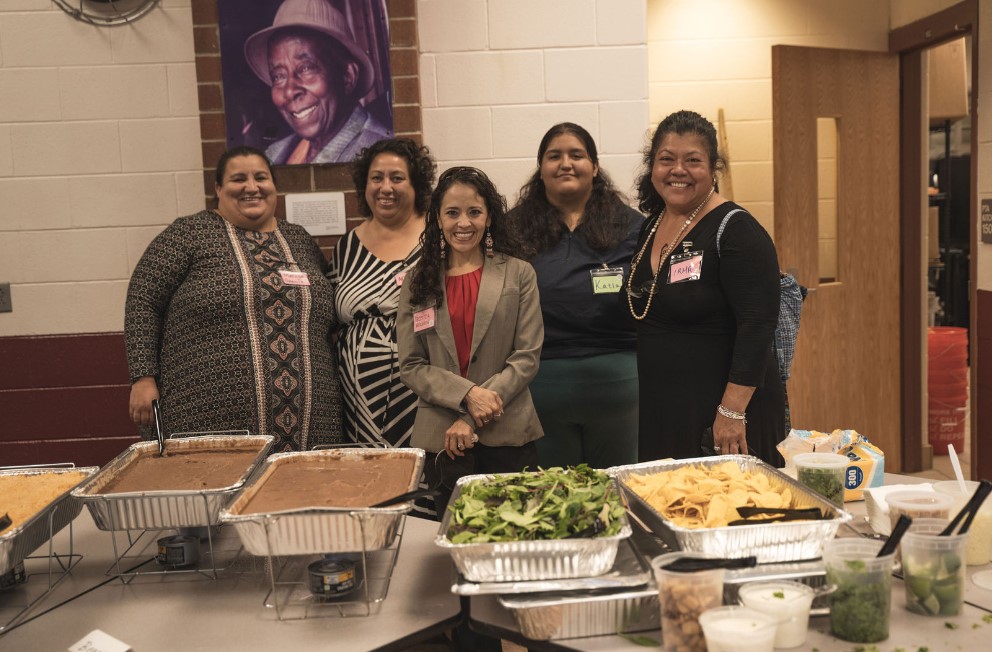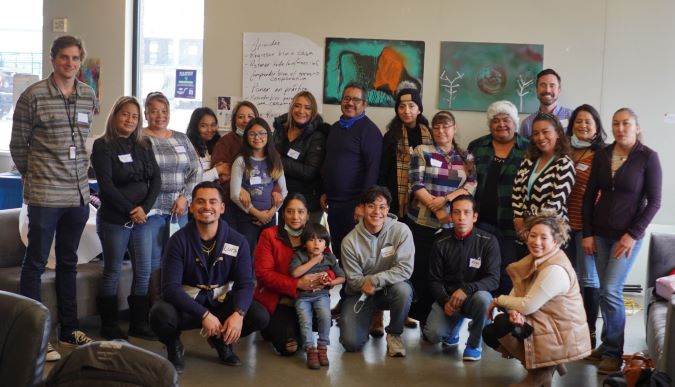Kaiser Permanente, along with city and state, fund new co-op development
by Karen Kahn

In July 2022, Kaiser Permanente awarded Denver’s Center for Community Wealth Building (CCWB) $360,000 for a three-year initiative to launch six to nine new cooperatives in Denver and the neighboring city of Aurora. CCWB is using cooperative development as an economic development strategy for low-income and underserved communities at risk of displacement resulting from gentrification. Worker cooperatives stabilize jobs and income for those who might otherwise be displaced while also helping to keep small businesses, the heart of these communities, alive.
Kaiser Permanente has been partnering with CCWB for several years to improve health in the metro Denver area by investing in the economic well-being of underserved neighborhoods.
“This investment directly contributes to Kaiser Permanente’s goal to help underrepresented communities improve financial security, reduce debt, and build wealth,” Ellen Weaver, director of Community Health and Engagement said. “Inclusive economic opportunity and growth are critical to both individual and community health.”
Economic Boom Has Exacerbated Inequality
By many measures, Denver is a thriving city. Before the pandemic, median household income — $85,641 — far outpaced the national median of $65,712. But fast-paced growth was not trickling down to low-income African American, native, and immigrant communities, where household incomes were 50 percent or less of the metro area’s median. These communities were being displaced by gentrification, which pushed out local businesses and long-time residents who could no longer afford housing.
Finding a Solution
The Center for Community Wealth Building (CCWB) was founded five years ago to address issues of economic and racial inequity, including the impact of gentrification on “legacy” residents and businesses. Before the organization was launched, Yessica Holguin, now its executive director, was hired as a “fellow” to develop a strategy for building and preserving opportunity in low-income neighborhoods. Says Holguin, “First, I went out and talked to the community. I come from a community organizing background. I wanted to understand the experience of gentrification from the perspective of the residents. And I wanted to hear what solutions resonated with them.”
“When people own their jobs, when they own their businesses, own their lives, the ripple effects are felt throughout the community,
–Yessica Holguin, executive director of Denver’s Center for Community Wealth Building
Holguin proposed a three-part strategy to build economic opportunity and grow wealth for Denver’s most marginalized communities, which was adopted by CCWB. It includes:
- Democratizing ownership through developing worker cooperatives;
- Strengthening entrepreneurial opportunities for people of color; and
- Encouraging anchor institutions to become economic engines within their communities by shifting some of their purchasing to local businesses.
These three intertwined strategies built on the work of The Democracy Collaborative and Cleveland’s Evergreen Cooperatives. There, too, the goal was to launch worker cooperatives that could fill the needs of anchor institutions, thereby incentivizing universities, hospitals, foundations and others to invest in their surrounding neighborhoods by “buying local.” The Evergreen Laundry Cooperative, which serves the Cleveland Clinic, is a great example of the partnerships that can help lift up a neighborhood.
In her conversations in the community, Holguin found, the worker cooperative concept resonated. Before she even completed her report, she began to work with community members on launching two cooperatives: Mujeres Emprendadores, a catering service started by immigrant women in Westwood, and Satya Yoga Cooperative, a yoga school by and for people of color that is a healing force in the community. Both remain successful cooperatives today.
Another early success was engaging the University of Denver, an important anchor institution. CCWB encouraged the university to shift its spending on catering for events to local providers rather than national chains. The university event planners were willing but felt they didn’t know where to go — they didn’t know what restaurants and caterers could provide, or what the quality would be. So CCWB put together a tasting event, “Eat Local Food.” Over 100 event planners from the university met 11 community caterers (including Mujeres Emprendadores) and formed relationships that have been invaluable. In addition, CCWB has continued to work with the university to reduce barriers to local procurement, by reviewing standard practices and looking for opportunities to make them more friendly to small businesses.
Democratizing Ownership

At the core of CCWB’s work is worker cooperative development. “When people own their jobs, when they own their businesses, own their lives, the ripple effects are felt throughout the community,” says Holguin.
Holguin learned about the power of cooperatives to transform communities during a stint in the peace corps in Nicaragua. Cooperatives not only helped to increase incomes, they gave worker-owners more control over their lives. She became convinced that communities like the one she grew up in — Swansea, a low-income immigrant neighborhood in Denver — would embrace worker-owned cooperatives, if residents understood how cooperatively owned businesses could benefit the community.
Launching Mujeres and Satya Yoga proved it could be done but extending that success broadly throughout Denver’s low-income neighborhoods presented multiple challenges: worker cooperatives were rare and not well understood, either at the grassroots or among the business and economic development professionals that support small businesses. Additionally, Denver needed a stronger ecosystem —providing business support services and capital — to ensure new and existing cooperatives would survive and grow.
In 2020, with a contract from the city of Denver, CCWB developed a road map [pdf] for creating a robust worker cooperative sector in the city of Denver. Drawing on learnings from Cleveland, Madison, New York City, and Berkeley, among others, they laid out how the city could support building public awareness, increasing knowledge and skills, and expanding access to capital to ensure cooperative businesses could thrive.
As a result of the roadmap, the city has partnered with CCWB to launch a train-the-trainer program to expand the number of people capable of supporting entrepreneurs to launch cooperatives. To make the program effective, CCWB developed culturally relevant outreach materials and curricula in Spanish and English. Says Holguin, “It’s not just potential worker-owners who need to see the benefits of cooperative businesses; we want the community to understand how widespread democratic ownership will benefit everyone.”
Making Denver a Leader in Cooperative Development
With a city government and Kaiser Permanente, one of the metro area’s anchor institutions, both supportive of a more inclusive economic development strategy, CCWB is embarking on its most ambitious cooperative development effort thus far. In addition to the $360,000 from Kaiser Permanente, the organization is expecting to draw down nearly $200,000 in American Rescue Plan funds allocated to the state. It has also received additional funding from the city.
CCWB will be working on four fronts. First, they will continue to build the ecosystem by educating business support organizations and professionals — business advisors, financial services providers, attorneys, small business technical assistance providers, and so on. Second, they will be working with the Denver Anchor Network to identify needs that an existing or new cooperative might be able to fulfill — for example, hospital valet services or janitorial services, which are currently provided by large national corporations. Third, CCWB will identify community members excited about providing those products and services and work with them to launch worker-owned businesses. Fourth, CCWB will guide and incubate the new worker-owned businesses that emerge from underserved communities.
Two worker-owned cooperatives are already in the pipeline. Mano a Mano is a navigator cooperative started by Spanish-speaking immigrants, predominantly women, who have long used a mutual aid model to help neighbors navigate domestic violence and public health services. During COVID-19 they accessed some public funds to reach out to neighbors and ensure they got the information and resources they needed. Now they are forming a worker cooperative whose clients will include government, healthcare, and other community-serving agencies that need to engage directly impacted communities.
El Alba, a shared services cooperative and food business incubator for immigrant entrepreneurs in Aurora, plans to serve the Anschutz Medical Campus, where the University of Colorado’s hospital systems are based. The cooperative has completed its incorporation but will need assistance developing onboarding and governance practices, as well as business support, going forward.
Holguin says, “We’d love to be able to promise more than 6 cooperatives with 30 to 35 jobs over the next few years. But we believe that this infusion of capital will build momentum around the cooperative business model. We are still building awareness. With more people trained to do outreach and training in their communities, that will grow. We are being very intentional, using a train-the-trainer model, so that demand does not exceed our capacity to support the success of new and existing cooperatives.”
A State Friendly to Cooperative Development
With an Office of Employee Ownership embedded in Colorado’s state government and a statute specific to incorporating cooperative businesses, Colorado is among the friendliest of states for launching worker cooperatives. Holguin says the state office has validated employee ownership and made it more mainstream. “It has convinced people that cooperatives are not scary but a proven business model,” she notes. The state office also provides small grants to help those forming worker cooperatives access the professional advice needed to do feasibility studies and file the paperwork for incorporation.
These kinds of institutional supports — along with engaged organizations like CCWB — give Denver a real opportunity to build a more inclusive economy that celebrates diverse communities, rather than one that exacerbates inequality, increases precarity, and drives low-income residents, predominantly people of color, out of the city altogether.
Karen Kahn is a communications consultant and the editor of Employee Ownership News.
To follow Employee Ownership News, subscribe to our monthly newsletter.
